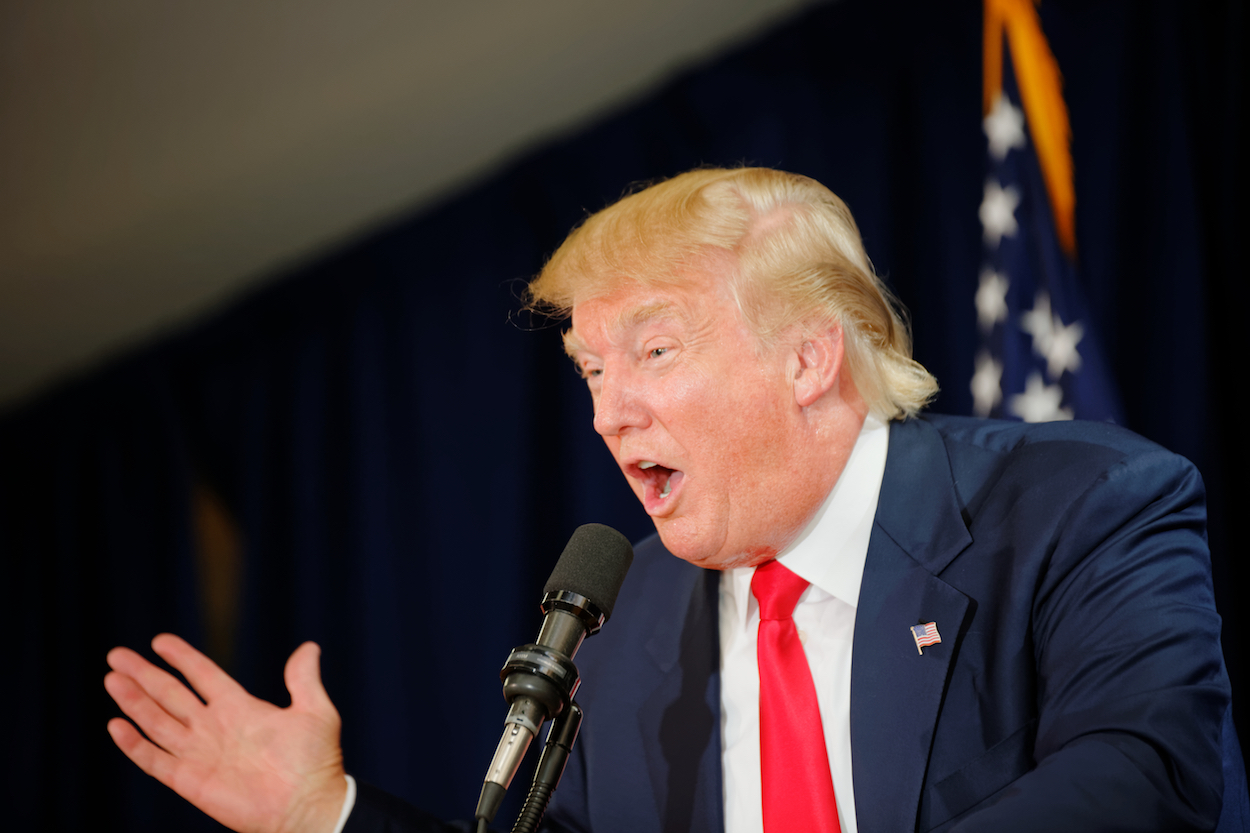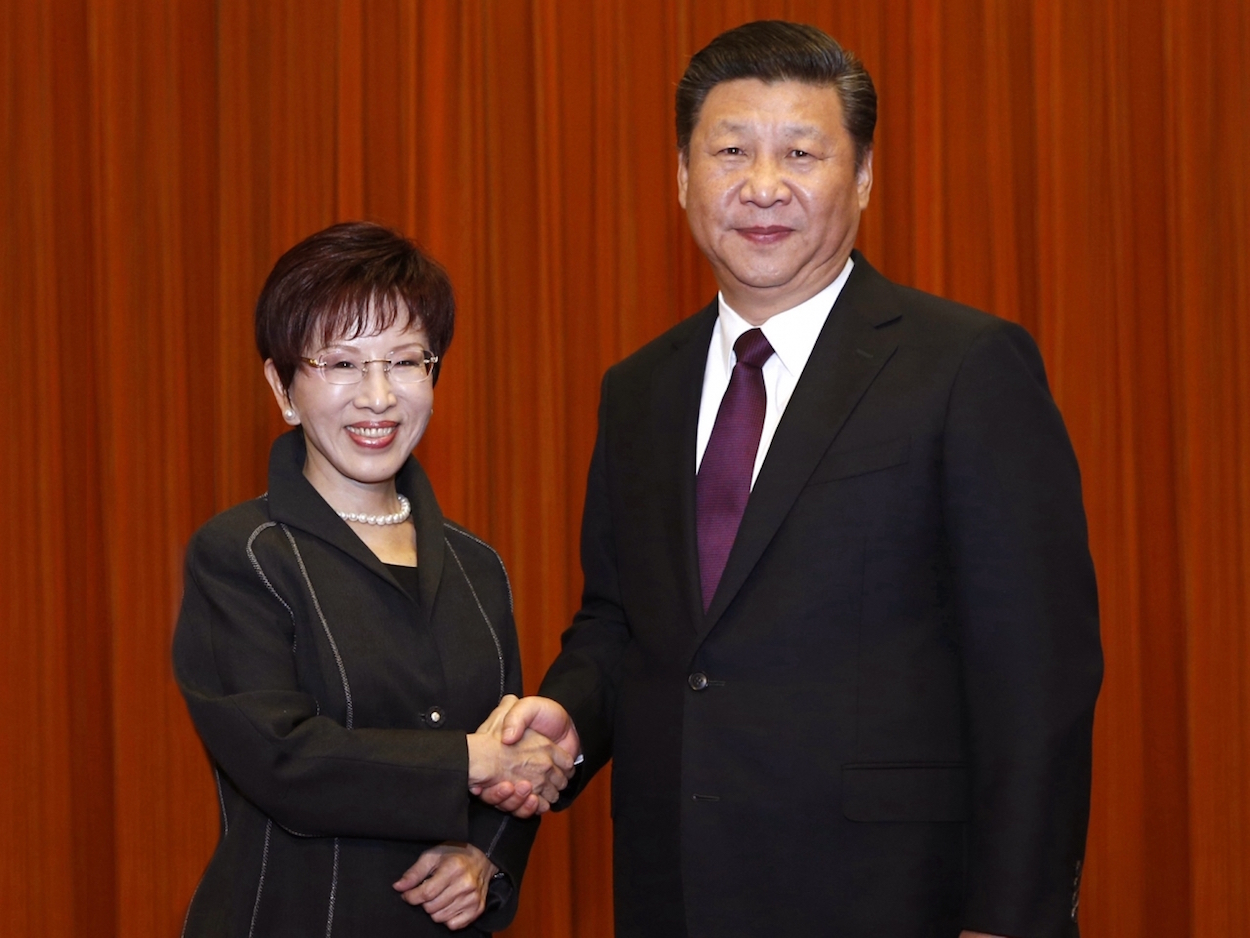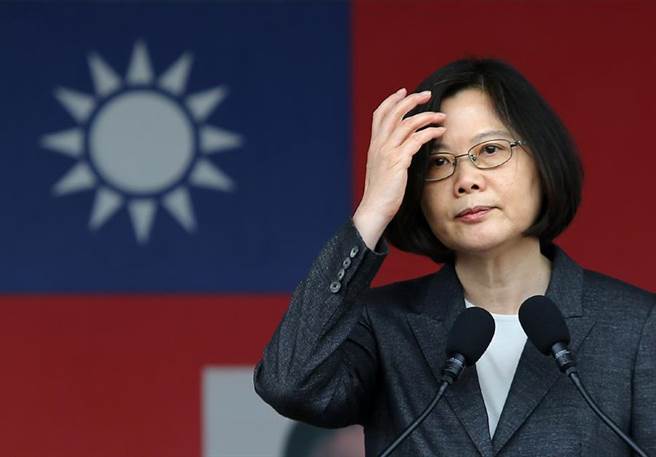by Garrett Dee
語言:
English
Photo Credit: Gage Skidmore/CC
Is The Trump Administration Simply Using Taiwan To Score Easy Points Against China? What Would The Possible Effects on Taiwan Be?
IN THE AFTERMATH of the Trump-Tsai phone call that has rocked the Taiwan political commentariat, members of the media have seemed to corral themselves into two seemingly diametrically-opposed camps: Those who would claim that anyone supporting contact between the Taiwanese and American president is a rabble rouser intent on hurting the collective feelings of the Chinese people, and in the other corner the ones who are decrying those people as apologists and falling all over themselves to cobble together an uncritical portrait of Donald Trump as the champion of Taiwan independence.
In response to the anonymously written appeal to American progressives to unreservedly and uncritically accept this turn of events published in Ketagalan Media, “Trump, Taiwan, and American Liberals”, a cut through the supposed histrionics to the core of the leftist Taiwan political observer’s trepidations about the fundamental mishandling of this issue by both sides seems in order. What appears to be sorely lacking in this debate is a third narrative: One wholeheartedly supportive of Taiwan’s path towards a progressive, independent society, but that doesn’t salivate over Donald Trump’s pittance of a gesture and his team of advisors’ devil-may-care attitude towards the long-term sustainable prosperity of Taiwan.
First of all, anything more than a cursory examination of Taiwan’s real political situation will dispel the notion that those who have had strong reactions to the Trump-Tsai call are overreaching and reveal that there is strong legitimacy to the idea that recent political history has placed Taiwan at the apex of a precariously dangerous situation vis-a-vis China. Eight years of Kuomintang rule and the Ma administration’s China-favorable economic policies have left Taiwan vulnerable to even the slightest machination from across the strait. A flourishing of free trade agreements, deregulation on Chinese investment and real estate purchase, and an opening up of markets between Taiwan and China means that China is presently Taiwan’s most prominent economic partner, a tangible fact of life for the Taiwanese working and middle class which these games of geopolitical dominance tend to shunt aside.
 Donald Trump. Photo credit: Michael Vadon
Donald Trump. Photo credit: Michael Vadon
This is not China apologist jingoism or parroting of the authoritarian regime in Beijing; it is reality as it currently stands for the 23 million inhabitants of Taiwan who find themselves in the position of having been left disproportionately reliant on China by the injudicious policy decisions of one generation of leaders and now further exposed to the brunt of the backlash caused by the grandstanding of the next. The reality of economic integration between Taiwan and China is undoubtedly not prescribed by necessity, and Taiwan is in desperate need to disentangle itself from its preponderant dependency on the Chinese economy and to prevent further fallout suffered from a change of whim in Beijing. However, though this need not be continued in perpetuity, the fact that as it stands Taiwan is in much closer proximity both geographically and economically to China than it is to the United States as a result of the previous Ma administrations is an unattractive truth that no one seems willing to admit, and while Trump and Tsai are ratcheting up political points, it will be Taiwan’s vibrant and innovative economy that is hit first and hardest. Without a set of binding assurances to expand Taiwan’s economy through investment and the appropriate involvement of regional partners willing to step in to make up the slack in Taiwan’s trade volume, Trump’s coming trade war with China will see Taiwan as its first causality.
Beyond the realm of economic health, progressively-minded Americans have more than enough reason to cast suspicion on the Trump administration’s intentions towards viable security in the Asia Pacific, none of which are based upon the overly-simplistic argument that the president-elect is a dunce or buffoon. Trump’s alternating isolationist and militaristic campaign rhetoric towards the Asia Pacific region threatened to escalate tensions to a dangerous level even before he won the election, and he seems intent to stay the course now that he has been given the mandate of governance. Amnesia should not set in over the fact that Trump quite vocally pledged to withdraw US troop presence from the Asia Pacific region against the objection of the US’s treaty allies while concurrently increasing naval presence in the South China Sea, all whilst proposing to arm Japan and South Korea with nuclear weapons in the process.
Indeed, when it comes to his burgeoning Asia Pacific policy, Trump has surrounded himself with hawks in lieu of doves, creating a team with an openly antagonistic bent towards geopolitical struggle with China. Peter Navarro, touted as Trump’s muse when it comes to the United State’ trade relations with China, has authored several works heralding the future Washington-Beijing war (including the not-so-subtly titled “The Coming War with China” and “Death by China”), and John Bolton, a name tossed about as a potential secretary of state, recently went on Fox News to put forth a defense of the brief phone call couched in the terms that Beijing has no right to tell a US president what to do. What has been consistently evident throughout this trading of barbs is that it is not the American Left, as some have claimed, that is using Taiwan to score points against Trump; it is Trump and his team who are using Taiwan to score points against China.
 Photo credit: Michael Vadon/CC
Photo credit: Michael Vadon/CC
This is not a team of people whose intent is to propagate a vibrant and prosperous Taiwan irrespective of what is occurring across the strait; rather, these are people with a demonstrated penchant for delivering a blow to Beijing by using Taiwan at Washington’s behest. That the first response they mustered following this phone call was to frame the Tsai-Trump conversation in the midst of the larger tenets of their strategy to bring China to heel is indicative of where they see Taiwan fitting into US foreign policy in regards to the region—and it isn’t as an equal partner. Though Steve Yates, rumored to be close to Trump’s transition team as a key shaper of its Taiwan policy, attempted to assure a rightfully skeptical public that the Trump administration would not be utilizing Taiwan as a bastion of American power aimed at China, even this misdirection can’t obscure the Trump team’s proclivity to push the region towards turmoil with the intent of the United States emerging victorious, regards of the costs to its allies.
The Tsai Administration Hardly An Exemplar Of Progressive Values? Why Is Tsai So Eager To Seek The Support of the Trump Administration?
FINALLY, THOUGH one might be tempted by the undoubted historical significance of her election, it is disingenuous to continue the fallacy that Tsai Ing-wen is a progressive heavyweight and to use it to attempt to entice American liberals to support her cross-straits policy. Though she may have become popularized in the American consciousness as a “female academic who loves cats and supports gay rights”, when given the opportunity to push for true progressive values in Taiwan, her government has already been a dismal failure on several issues at the heart of Taiwanese society.
Her party’s refusal to put their full weight behind the amendment to Article 972 which defines marriage as between one man and one woman has resulted in a deadlock of Taiwanese civil society and a stalling of the historic bill for marriage equality, regardless of the fact that opinion polls show that a majority of the Taiwanese electorate supports the change. Additionally, though the fact of Taiwan having universal healthcare is inexplicably implied to be related to Tsai in the open letter in Ketagalan Media, in reality the Tsai administration’s cutbacks of public holidays have resulted in widespread strikes and protests that have caused her to run afoul of labor organizations and witness plummeting approval ratings. Her track record on racial justice is equally abysmal, with indigenous groups having staged sit-ins in front of the presidential office to call attention to her unwillingness to tackle issues of transitional justice and address both historic and present-day judicial grievances against indigenous communities, a further testament to the failure of this administration to push for a more progressive society.
 Hung Hsiu-Chu meeting with Xi Jinping. Photo credit: AP
Hung Hsiu-Chu meeting with Xi Jinping. Photo credit: AP
In all likelihood, Tsai arranged this phone call as a result of the pressure she is currently facing from the KMT opposition party, who has decided to pursue their own cross-strait policy independent from and without the mandate of the ruling DPP government. Just last month KMT chairperson Hung Hsiu-chu and a delegation of KMT elected officials met with Chinese president Xi Jinping in Beijing, making her the second KMT chairperson in as many years after former president Ma to meet with Xi, a snub to the sitting president whose party has never received similar treatment and who faces an opposition with considerable backing from a powerful aggressor.
This may be a blow which provokes considerable anxiety for Tsai, and may partially explain why Tsai is so eager to seek the support of a US administration that may view Taiwan only as the first line of assault in a coming conflict with China, seeing as we can view her meeting with Trump as a similar move oriented as Hung’s, except oriented towards the United States. But in doing so, Tsai has hastily wagered her country’s well-being for the sake of hoping to posture herself in a place of superiority over the opposition party. There is a need to push Tsai to not retreat on her progressive ideals, to not give into one-upmanship in regards to her own party’s future and to put Taiwan on a tenable path towards sustained democratic vibrancy. This ploy to raise Taiwan’s profile by arranging a phone call which even she admits will not result in any concrete policy changes is understandable given the denigration to which Taiwan has been subjected by its allies—including the Obama administration—in the past. However, it is a stretch to imagine that the Tsai-Trump relationship is one based on mutual respect and a firm commitment to a stable and prosperous Taiwan.
Conclusion
WHILE TRUMP’S proverbial thumbing of the nose at Beijing might satisfy a juvenile desire to spit in the face of the Chinese government and thus produce an ephemeral sense of glee, it is a fundamentally irresponsible way to conduct what is the pressing need to reshape the US-Taiwan relationship to meet the challenges of an increasingly aggressive Chinese regime.
Instead of an escalation of tensions as a result of a build-up of weaponry and a flurry of extemporaneous tweeting, efforts would be better spent advocating for full Taiwanese ascendancy to the regional and global economic and security framework through a series of legally-binding treaty arrangements. The historical error of the Carter administration in attempting jettison Taiwan in 1979 needs to be remediated through thoughtful US action along such lines that shields Taiwan from Chinese aggression, and allows the relationship between America and Taiwan to grow and expand beyond the polarized geopolitical struggle for dominance between two superpowers. The single utterance of the word “Taiwan”, which has seemingly sent more than a few thoughtful commentators into a head spin attempting to forecast a golden age of US-Taiwan relations, is no victory seeng as it comes from a nascent administration steered by a man with a nonexistent foreign policy doctrine, and it is dismaying to see it construed as such by many otherwise cognizant commentators who have been taken in by a well-known charlatan’s ruse.
 Tsai Ing-Wen. Photo credit: China Times
Tsai Ing-Wen. Photo credit: China Times
So to American progressive voters, by all means, make an independent, progressive Taiwan one of the issues you care deeply about, and don’t fall to pressure that you have to betray your fundamental beliefs in order to do so. However, do not acquiesce to the narrative currently being popularized that anything less than uncritical approval of the impetus behind this phone call equates to full support for Beijing’s isolation of Taiwan. Use your voice to fight for a free and dignified Taiwan that stands proud amongst its allies and not begging for scraps from Trump’s table.

